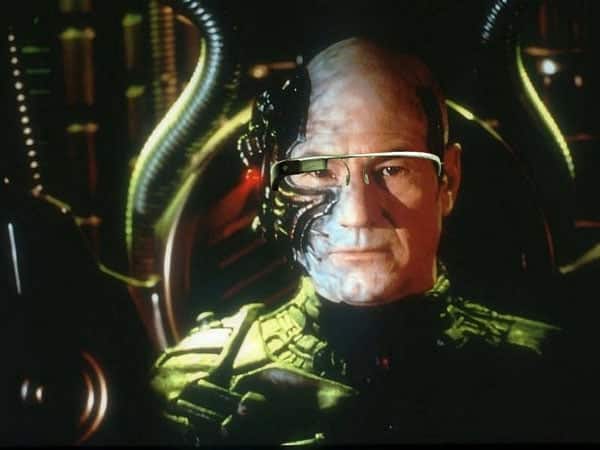There are two ways to look at Google Glass, the eyeware-spyware the Internet Goliath is releasing later this year. Glass half full: it services us for convenience. Glass half empty: it services the corporation by allowing our eye glasses to record every public and private moment that goes into a digital profile in the cloud so Google can serve us up to the corporations that want to reach us.
 In other words, are we wearing Google Glasses or are Google Glasses wearing us?
In other words, are we wearing Google Glasses or are Google Glasses wearing us?
There's no question that the privacy ramifications are catastrophic. Peeping Toms, child predators, and sadistic X-s will have the ultimate tool for chaos. The corporation has the ultimate tool to map our behavior so it can sell to our addictions, cravings and weaknesses almost as we are experiencing them. Walk by the bar and the Heineken pops onto your Glass.
Absent the "Do Not Track" standard Google opposes, the company will have a digital warehouse of private and public moments that inform it and any corporation willing to pay top dollar about exactly who we are and what we do. Google has the ultimate drone to map humanity for commercial gain in the guise of an Iphone you wear.
So it's shocking to hear Jonathan Zittrain, co-founder of the Berkman Center for Internet and Society at Harvard, a "contributor" to Marketplace radio, use an example on that show this morning that turns the Glass question toward protestors being able to prevent police abuse at a rally. Berkman is a major recipient of big bucks from Google, an important omission in the interview.
In some Google-jitsu, Zittrain said that people aren't worried about Google spying on them, but us spying on each other.
"It's not data collected by Google that will make people nervous," Zittrain said. "But what other people will collect."
Really?
That's not what Consumer Watchdog's polling says. Americans don't want corporations tracking them. Google doesn't want or respect a "Do Not Track" option for the public. That option to delete data is ever more critical if Google is going to collect the living images our life in its cloud and we cannot hit delete.
You're likely to hear a lot of First Amendment voices weigh in for the Glass half-full theory in the coming days and months. Google spreads a lot of its money to civil libertarians who agree that Google's data shouldn't be subject to government subpoenas. But the truth is Google's use of the data will in the end be more dangerous than the government's, if we allow it to own the videos of our lives. That's because its mission is commercial. History has taught us the drive for profit respects no social mores, ethical customs, or rule of law.
Glass opens a Pandora's box for society that will forever change it unless the public gets the right to hit delete and turn on its "Do Not Track Me" option. If the video of our lives is allowed to live in Google's cloud, life itself will forever be diminished by the commercial takeover of our vision. Who will program what our children see in their Glasses? Will the price of finding a map be the programming of mindless consumption? Will we see what Google doesn't want us to see?
If Google gets control of what we see it can program how we see it. That is serious cause for the public to fear regardless of Google mouthpieces say.






